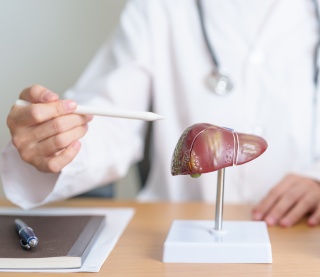Hepatitis Care
Hepatitis Care at UVM Health
Hepatitis is inflammation that damages your liver, a vital organ that helps to fight infections, process nutrients and remove toxins from your blood. It is often caused by a viral infection.
In many cases, hepatitis is an acute (short-lived) infection, but it can become chronic (long-lasting). Over time, chronic hepatitis infection leads to liver damage. Specialized, timely treatment can help lessen liver damage and prevent potentially life-threatening complications. We coordinate your care quickly, so you start the right treatment, right away.
At University of Vermont Health, our board-certified infectious disease specialists provide full-spectrum care for viral hepatitis in a caring and supportive environment. We treat many patients with viral hepatitis each year, using leading-edge therapies that promote excellent outcomes.

Why Choose UVM Health?
As the leading infectious disease program in the region, we offer:
- State-of-the-art treatment: We offer the entire range of available viral hepatitis treatments, including oral medications, injections and vaccinations. Thanks to our network of specialists, we can refer patients for liver transplants if a hepatitis infection progresses to liver failure.
- Academic emphasis: As part of a health system anchored by an academic medical center, our physician-leaders are active researchers, many of whom are training the next generation of experts. This involvement in research and education demands that we stay on the leading edge of our field, continually bringing you the most up-to-date treatments available.
- Convenient access: You benefit from short wait times and convenient access to care. We prioritize scheduling appointments quickly and offer digital health visits to help you get the care you need, when and where you need it.
Types of Hepatitis
Our experts offer comprehensive evaluation and treatment for all types of viral hepatitis:
- Hepatitis A: Highly contagious infection which usually spreads through contact with contaminated food or water. Hepatitis A usually resolves on its own.
- Hepatitis B: Primarily spreads through contact with an infected person’s blood or body fluids. These infections may become chronic, which can lead to liver scarring, cancer or liver failure.
- Hepatitis C: Typically spreads through contact with an infected person’s blood. Most people don’t know they have hepatitis C until routine tests show liver damage, so screening for it is important. All adults should be screened for hepatitis C at least once.
- Hepatitis E: Spreads through contact with contaminated food or water. This type of hepatitis is extremely rare in the United States. This infection usually resolves on its own within several weeks or months.
Diagnosing Viral Hepatitis
If you think you might have been exposed to a hepatitis virus, your provider will run tests to diagnose or rule out infection. Detecting and treating hepatitis early improves your chances of a good outcome.
To diagnose hepatitis, our team may use:
- Blood tests: Look for hepatitis viruses in your bloodstream
- FibroScan: A noninvasive ultrasound that looks for liver damage or stiffness (fibrosis)
Hepatitis Treatment
Our team provides most available treatments for hepatitis, including the newest options. Some types of hepatitis cause mild infections that last several weeks, while others are more long-lasting and serious. Depending on the type of hepatitis you have and your symptoms, treatment at UVM Health may include:
Some hepatitis infections go away without clinical treatment. If you have an acute hepatitis infection, your doctor may recommend resting, eating a nutritious diet and drinking plenty of water while you recover.
Antiviral drugs can help your body fight hepatitis infection and slow damage to your liver. You may take oral or injectable medicines.
If you know you’ve come into contact with hepatitis B, you should receive an immunoglobulin injection within 24 hours. Immunoglobulin is an antibody that helps your body fight the infection and lowers your risk of getting sick with hepatitis.
The United States Food and Drug Administration (FDA) has approved vaccines to prevent hepatitis A and B. There’s currently no vaccine for hepatitis C. However, if you have hepatitis C, your doctor will likely recommend getting the hepatitis A and B vaccinations to lower your risk of complications and liver damage.
The hepatitis A and B vaccines are part of the standard immunization schedule for infants and children. The Centers for Disease Control and Prevention (CDC) recommends that unvaccinated adults receive hepatitis immunization if they are at increased risk of infection. This includes those who:
- Are experiencing homelessness
- Have a risk of occupational exposure
- Have a risk of sexual exposure
- Have diabetes
- Have HIV
- Travel internationally to places where hepatitis is common
- Use or inject drugs
Locations Near You
Share your location to see nearby providers and availability
111 Colchester Avenue
Main Campus, East Pavilion, Level 5
Burlington, VT 05401-1473
130 Fisher Road
MOB C
Berlin, VT 05602-9000
159 Margaret Street
Suite 100
Plattsburgh, NY 12901

